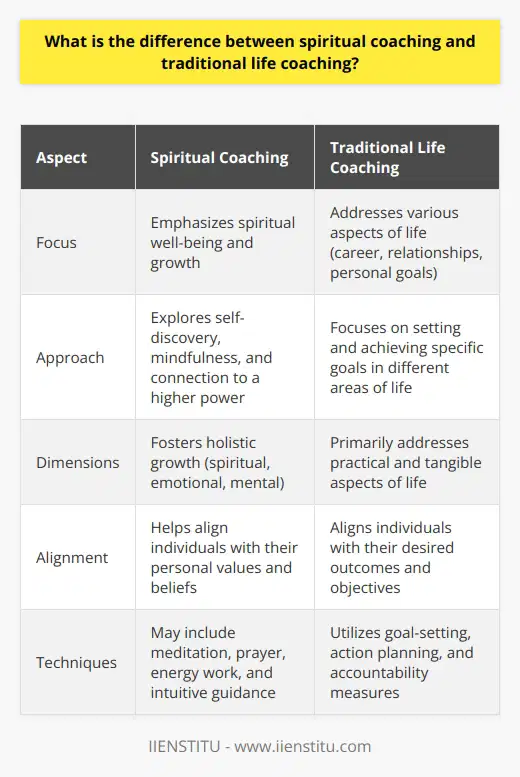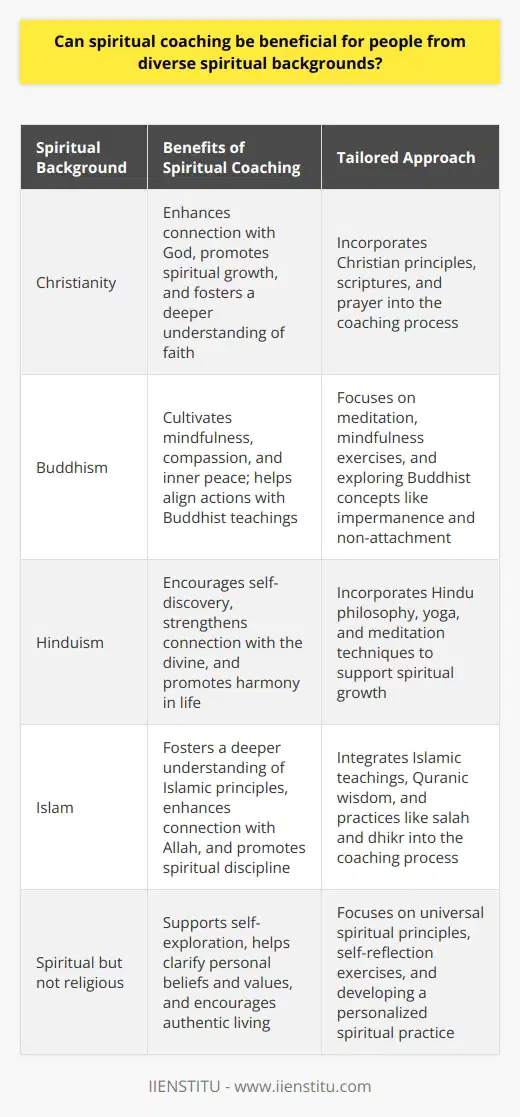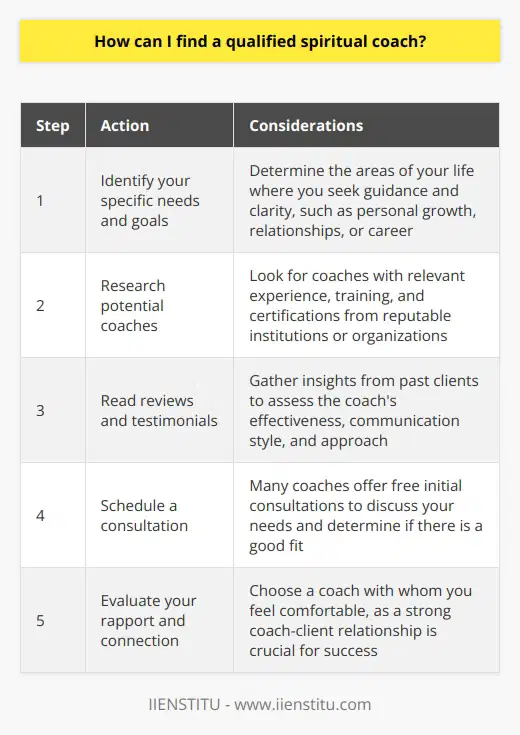
Spiritual coaching is a comprehensive and mindful approach to personal development that places a strong emphasis on nurturing and deepening an individual's spiritual growth and connection with their inner self, the universe, or their chosen source of spirituality. This transformative practice involves a skilled coach guiding and supporting individuals on their spiritual journey, helping them explore their beliefs, values, and inner wisdom.
Through meaningful conversations, introspective exercises, and personalized guidance, spiritual coaching empowers individuals to discover a profound sense of purpose, inner peace, and alignment with their spiritual path, ultimately leading to a more fulfilling and harmonious life.
It differs from traditional life coaching by emphasizing spiritual well-being as the foundation for overall wellness. The core principles of spiritual coaching include:
Self-Discovery and Awareness: Encouraging individuals to explore their inner selves, beliefs, values, and purpose.
Mindfulness and Presence: Fostering a state of mindful awareness and living in the present moment.
Connection to a Higher Power: Facilitating a deeper understanding and connection with a higher power, whether defined as a deity, the universe, nature, or one's higher self.
Alignment with Personal Values: Guiding individuals to live in alignment with their personal values and ethics.
Emotional and Spiritual Healing: Assisting in overcoming emotional blockages and fostering spiritual healing.
Holistic Growth and Development: Emphasizing the interconnectedness of mental, physical, emotional, and spiritual aspects of a person.
The Importance of Spiritual Growth in the Modern World
In today's fast-paced and often materialistically oriented society, spiritual growth has become increasingly important. It offers a pathway to:
Inner Peace: Navigating life's challenges with a sense of calm and resilience.
Purpose and Fulfillment: Finding deeper meaning and purpose in life beyond material success.
Connection and Compassion: Enhancing empathy and connection with others, leading to more harmonious relationships.
Self-Realization: Achieving a sense of self-realization and actualization.
How This Guide Can Help Readers on Their Spiritual Journey
This guide is designed to support readers in their spiritual journey by:
Providing Practical Tools and Techniques: Offering actionable steps for enhancing spiritual well-being.
Sharing Insights and Wisdom: Drawing from various spiritual traditions and modern psychological practices.
Creating a Supportive Community: Encouraging engagement with a community of like-minded individuals on similar spiritual paths.
Personalized Pathways: Recognizing that each individual's spiritual journey is unique and providing diverse pathways for exploration.
Through this guide, readers can embark on a transformative journey towards spiritual fulfillment and a deeper understanding of themselves and the world around them.
The Foundations of Spiritual Coaching
Understanding the Human Spirit: A Holistic View
The concept of the human spirit in spiritual coaching is viewed holistically, acknowledging that it encompasses more than just religious or metaphysical aspects. This perspective considers the spirit as an integral part of our being that influences our thoughts, emotions, and actions. Key aspects include:
Inner Wisdom and Intuition: Recognizing the inner voice or intuition as a guide.
Life Force and Energy: Understanding the spirit as a source of life force and energy that drives our existence.
Interconnectedness: Acknowledging the interconnected nature of the spirit with the mind, body, and external world.
Transcendence: Exploring the ability of the spirit to transcend beyond immediate physical and material experiences.
Key Philosophies and Traditions in Spiritual Coaching
Spiritual coaching draws from a diverse range of philosophies and traditions, each offering unique insights and practices:
Eastern Philosophies: Incorporating principles from Buddhism, Hinduism, and Taoism, focusing on mindfulness, meditation, and the concept of interconnectedness.
Western Spirituality: Integrating concepts from Judeo-Christian traditions, emphasizing values, ethics, and personal relationships with the divine.
Indigenous and Shamanic Traditions: Learning from native cultures about the sacredness of nature, ancestral wisdom, and spiritual rituals.
Contemporary Spiritual Movements: Including New Age and modern spiritual practices that blend various traditions for personal growth and self-actualization.
The Role of a Spiritual Coach
A spiritual coach serves as a guide and mentor in an individual's spiritual journey, with roles including:
Facilitator of Self-Discovery: Helping individuals uncover their true spiritual beliefs and values.
Provider of Resources and Tools: Offering practices, readings, and exercises for spiritual development.
Supportive Listener: Being an empathetic and non-judgmental listener to clients' experiences and challenges.
Challenger and Motivator: Encouraging clients to step out of their comfort zones and confront spiritual and emotional blockages.
Personalized Guidance: Tailoring coaching to the unique spiritual path and needs of each individual.
Connector to Community: Introducing clients to a broader spiritual community for shared learning and support.
The foundations of spiritual coaching are about understanding and nurturing the human spirit through a combination of wisdom from various traditions and the personalized guidance of a coach. This holistic approach aims to foster deeper spiritual understanding, personal growth, and a more meaningful connection with oneself and the world.
Self-Discovery and Awareness
Techniques for Self-Assessment and Introspection
Self-discovery and awareness are central to spiritual coaching, and various techniques are employed to facilitate this process:
Journaling: Encouraging regular writing to reflect on thoughts, feelings, and experiences, offering insights into one's inner world.
Meditation and Mindfulness Practices: Utilizing meditation to quiet the mind, focus on the present, and gain clarity about one’s thoughts and emotions.
Guided Visualizations: Employing imaginative exercises to explore inner desires, fears, and dreams.
Personality and Spiritual Assessments: Using tools like the Myers-Briggs Type Indicator or Enneagram to understand personality traits and how they influence spiritual perspectives.
Life Mapping: Creating visual maps of one’s life journey to identify patterns, turning points, and significant events that shape spiritual beliefs.
Exploring Personal Values, Beliefs, and Spiritual Needs
Understanding one's values, beliefs, and spiritual needs is crucial in spiritual coaching:
Value Clarification Exercises: Identifying core values and assessing how well current life choices align with these values.
Belief System Analysis: Encouraging clients to examine and articulate their belief systems, including religious, spiritual, and philosophical beliefs.
Spiritual Needs Assessment: Helping individuals identify their spiritual needs, such as the need for community, purpose, or connection with nature or a higher power.
Cultural and Background Considerations: Taking into account cultural, familial, and societal influences on one's spiritual beliefs and practices.
The Importance of Mindfulness and Presence
Mindfulness and presence are vital components in spiritual coaching, offering several benefits:
Enhanced Self-Awareness: Cultivating mindfulness leads to greater awareness of one’s thoughts, feelings, and actions.
Stress Reduction: Regular mindfulness practice can reduce stress and anxiety, promoting a sense of calm and well-being.
Emotional Regulation: Improving the ability to manage and respond to emotions in a healthy way.
Increased Empathy and Compassion: Developing a deeper understanding and connection with others.
Living Intentionally: Encouraging a more conscious, deliberate approach to life, aligned with one’s spiritual values and goals.
Through techniques of self-assessment, introspection, and the cultivation of mindfulness and presence, individuals engaged in spiritual coaching can achieve a deeper understanding of themselves, leading to meaningful personal and spiritual growth.
Overcoming Inner Barriers
Identifying and Addressing Common Spiritual Blockages
A key aspect of spiritual coaching involves recognizing and overcoming various inner barriers that hinder spiritual growth. Common spiritual blockages include:
Limiting Beliefs: Uncovering deeply held beliefs that limit potential and growth, such as feelings of unworthiness or fear of change.
Past Traumas and Emotional Wounds: Addressing unresolved emotional pain or trauma that can obstruct spiritual development.
Negative Thought Patterns: Identifying and transforming persistent negative thoughts that can lead to a disconnection from one’s spiritual self.
Lack of Forgiveness: Recognizing how holding onto anger or resentment can create emotional and spiritual blockages.
Resistance to Change: Overcoming the fear or reluctance to embrace change, which is often a necessary part of spiritual evolution.
Techniques for Emotional Healing and Forgiveness
Emotional healing and forgiveness are crucial for overcoming spiritual barriers, and several techniques are employed in this process:
Guided Meditation and Visualization: Using meditation to release negative emotions and visualize a state of forgiveness and emotional freedom.
Expressive Therapies: Engaging in art, music, or movement therapies to express and process emotions in a healing way.
Affirmations and Positive Self-Talk: Implementing affirmations to cultivate a more positive and forgiving mindset.
Counseling and Therapy: Working with professional therapists or counselors to address deep-seated emotional issues and traumas.
Forgiveness Exercises: Practicing specific exercises designed to foster forgiveness towards oneself and others.
Dealing with Doubt and Skepticism in Spiritual Growth
Doubt and skepticism can be significant obstacles in one’s spiritual journey. Approaches to address these issues include:
Open Dialogue and Inquiry: Encouraging open discussions about doubts and skepticism, allowing for a healthy exploration of these feelings.
Educational Resources: Providing books, articles, and other materials that offer different perspectives on spirituality.
Mindfulness and Reflective Practices: Using mindfulness to observe and reflect upon the sources of doubt without judgment.
Community Support: Engaging with a community of individuals on similar spiritual paths can provide support and validation.
Personalized Spiritual Practices: Tailoring spiritual practices to align with the individual’s unique beliefs and experiences, making spirituality more relevant and less abstract.
By addressing common spiritual blockages, employing techniques for emotional healing and forgiveness, and dealing effectively with doubt and skepticism, individuals can navigate the challenges they face on their spiritual journey more effectively.
This process enables a deeper engagement with their spiritual growth, leading to greater fulfillment and personal transformation.
Developing Spiritual Practices in Spiritual Coaching
Introduction to Meditation, Prayer, and Other Spiritual Disciplines
Integrating spiritual practices such as meditation, prayer, and other disciplines is a fundamental part of spiritual coaching, as these practices foster deeper spiritual connection and growth:
Meditation: Teaching various forms of meditation, such as mindfulness, transcendental, or guided meditation, to quiet the mind, enhance focus, and promote inner peace.
Prayer: Exploring different prayer methods, from traditional religious prayers to more personal, contemplative forms of prayer that align with the individual's beliefs.
Yoga and Tai Chi: Incorporating body-mind practices like yoga and Tai Chi, which combine physical postures, breathing techniques, and meditation for holistic spiritual well-being.
Mindful Movement: Encouraging practices like walking meditation or mindful exercise, where movement is used as a form of spiritual expression and awareness.
Creating a Personalized Spiritual Routine
A personalized spiritual routine is key in maintaining and deepening one's spiritual practice:
Assessment of Personal Needs and Preferences: Tailoring practices to fit the individual's lifestyle, interests, and spiritual inclinations.
Daily Rituals: Establishing daily rituals such as morning meditation or evening gratitude journaling to create consistency and discipline in one's spiritual life.
Adaptability and Flexibility: Encouraging flexibility in practices to adapt to changing life circumstances and spiritual growth.
Integrating Spirituality into Everyday Life: Finding ways to incorporate spiritual practices into regular activities, like mindful eating or practicing kindness and compassion in daily interactions.
The Role of Rituals and Symbols in Spiritual Development
Rituals and symbols play a significant role in deepening the spiritual experience:
Cultural and Personal Rituals: Exploring rituals from various cultures or creating personal rituals that hold special meaning and help in connecting to the spiritual aspect of life.
Use of Symbols: Utilizing symbols that resonate on a personal level, such as crystals, mandalas, or religious icons, to enhance spiritual practice and serve as reminders of spiritual commitments.
Nature and Sacred Spaces: Engaging with nature or creating a personal sacred space as a form of ritual to feel connected to the larger universe or a higher power.
Seasonal and Life-Cycle Rituals: Observing rituals related to natural cycles or life milestones to honor the spiritual significance of different phases of life.
Developing and maintaining spiritual practices, personalized routines, and engaging in meaningful rituals and symbols are essential aspects of spiritual coaching. These practices help individuals connect more deeply with their spiritual selves, leading to a more enriched and fulfilling spiritual journey.
The Power of Connection
The foundation of a fulfilling spiritual journey often lies in the connections we make with others who share similar paths or values. Key elements in building spiritual relationships and communities include:
Joining Spiritual Groups or Communities: Encouraging participation in groups, whether they are based in specific religious traditions, meditation circles, yoga classes, or spiritual study groups, to foster a sense of belonging and shared purpose.
Creating Safe Spaces for Sharing: Establishing environments where individuals feel safe to share their spiritual experiences and learnings without judgment, fostering deeper connections.
Interfaith and Cross-Cultural Exchanges: Promoting dialogues and interactions among different faiths and cultures to broaden understanding and appreciation of diverse spiritual perspectives.
Community Service and Volunteer Work: Engaging in service-oriented activities that align with spiritual values, enhancing a sense of connection not only with others but also with the broader world.
The Importance of Mentorship and Guidance
Mentorship plays a crucial role in spiritual development, offering guidance, inspiration, and support:
Finding a Spiritual Mentor or Coach: Seeking individuals who can provide guidance and support based on their own spiritual experiences and wisdom.
Learning from Spiritual Leaders and Teachers: Drawing inspiration and learning from the teachings of various spiritual leaders, both contemporary and historical.
Peer Mentorship: Engaging in peer-to-peer mentorship where individuals can share experiences and support each other’s spiritual growth.
Role of a Coach as a Facilitator: Utilizing a spiritual coach not only as a guide but also as a facilitator who helps in connecting with mentors and like-minded peers.
Sharing and Growing Spiritually with Others
Sharing one's spiritual journey with others is not just about building connections, but also about enriching one's own spiritual growth:
Group Practices and Workshops: Participating in group activities like workshops, retreats, or spiritual practice sessions to learn and grow together.
Discussion and Study Groups: Engaging in discussions or study groups focused on spiritual texts, concepts, and philosophies, which can lead to deeper insights and understandings.
Sharing Personal Experiences: Openly sharing personal spiritual experiences, challenges, and insights, which can provide encouragement and perspective to others.
Collaborative Spiritual Projects: Working together on projects that have a spiritual dimension, such as community gardens, art installations, or charity events, fostering a sense of communal spiritual achievement and fulfillment.
The power of connection in spiritual coaching underscores the importance of building spiritual relationships and communities, seeking mentorship and guidance, and sharing and growing spiritually with others.
These connections not only support individuals in their personal spiritual journeys but also contribute to a broader sense of unity and understanding within the spiritual community.
Integrating Spirituality in Daily Life
Practical Tips for Maintaining Spiritual Awareness
Integrating spirituality into daily life is about maintaining a constant connection with one's spiritual essence, even amidst the hustle and bustle of everyday routines. Practical ways to achieve this include:
Mindful Practices: Incorporating mindfulness in daily activities like eating, walking, or even during work to remain spiritually grounded and present.
Daily Affirmations and Intentions: Starting the day with positive affirmations or setting spiritual intentions to maintain a focus on personal spiritual goals.
Gratitude Journaling: Keeping a gratitude journal to regularly acknowledge and appreciate the blessings in life, fostering a positive, spiritually aligned mindset.
Regular Spiritual Check-ins: Setting aside time each day for self-reflection and spiritual self-assessment to stay aligned with spiritual values and goals.
Mindful Technology Use: Being conscious of how technology is used, ensuring it supports rather than distracts from spiritual growth, such as listening to spiritual podcasts or following inspirational accounts.
Balancing Material and Spiritual Aspects of Life
Balancing the material and spiritual aspects of life is essential for holistic well-being:
Prioritizing Spiritual Values: Making decisions that reflect spiritual values, even in material aspects like career choices or spending habits.
Simplifying Life: Practicing simplicity and minimalism to reduce material distractions and focus more on spiritual growth.
Work-Life-Spirit Balance: Finding a balance between work, personal life, and spiritual practices to ensure none is neglected.
Integration Rather Than Segregation: Viewing material and spiritual aspects not as separate but as integrated parts of life, where one can find spiritual significance in material experiences and vice versa.
Making Ethical and Compassionate Choices
Ethical and compassionate choices are a reflection of deep spiritual values:
Ethical Decision-Making: Considering the ethical implications of choices and actions, ensuring they align with personal and spiritual ethics.
Compassionate Living: Practicing compassion in interactions with others, understanding that this is a reflection of one's own spiritual beliefs and values.
Service and Contribution: Engaging in acts of service and contribution, viewing them as essential expressions of spiritual practice.
Environmental Stewardship: Being mindful of the environment and engaging in sustainable practices, recognizing the spiritual duty to care for the planet.
Integrating spirituality into daily life involves a conscious effort to maintain spiritual awareness, balance material and spiritual needs, and make ethical and compassionate decisions. This integration allows individuals to live a spiritually enriched life, where everyday actions and decisions are infused with spiritual purpose and meaning.
Advanced Spiritual Concepts in Spiritual Coaching
Exploring Deeper Spiritual Theories and Concepts
As individuals progress in their spiritual journey, they often delve into more advanced and complex spiritual theories and concepts. This exploration can include:
Mystical and Transcendental Experiences: Studying and understanding experiences that transcend ordinary consciousness, such as mystical states or transcendental meditation.
Esoteric Teachings: Delving into the more esoteric or hidden aspects of spiritual traditions, which often include deeper metaphysical theories and practices.
Quantum Spirituality: Exploring the intersection of spirituality and science, particularly how quantum physics relates to concepts like consciousness, reality, and the nature of the universe.
Theological and Philosophical Studies: Engaging with complex theological and philosophical discussions that have shaped spiritual thought throughout history.
Advanced Meditation and Yogic Practices: Practicing more advanced forms of meditation and yoga that aim to elevate consciousness and spiritual understanding.
The Journey Towards Enlightenment and Self-Realization
Enlightenment and self-realization are often seen as pinnacle experiences in the spiritual journey:
Stages of Spiritual Awakening: Understanding the different stages and signs of spiritual awakening and enlightenment, recognizing that this journey is unique for each individual.
Practices for Self-Realization: Engaging in practices that are specifically aimed at self-realization, such as deep meditation, introspection, and self-inquiry.
Overcoming the Ego: Learning how to transcend the ego and its limitations, recognizing the true self that is connected with the divine or universal consciousness.
Continuous Learning and Growth: Emphasizing that enlightenment is not a final destination but a continuous process of learning, growing, and evolving spiritually.
Understanding the Interconnectedness of All Life
A key advanced spiritual concept is the recognition of the interconnectedness and interdependence of all life:
Oneness and Unity: Exploring the concept that all life is interconnected and that a sense of separation is an illusion.
Ecological and Universal Connectivity: Understanding how our actions impact the larger ecological system and the universe, leading to a more responsible and conscious way of living.
Compassion and Empathy: Cultivating deep compassion and empathy as a reflection of the interconnectedness of all beings.
Harmony and Balance: Seeking harmony and balance in life, recognizing that our individual well-being is intrinsically linked to the well-being of others and the planet.
Advanced spiritual concepts challenge individuals to expand their understanding and experience of spirituality. They involve exploring deeper theories, aiming for enlightenment and self-realization, and recognizing the profound interconnectedness of all life. This advanced exploration often leads to profound personal transformations and a deepened sense of spiritual fulfillment.
Overcoming Challenges and Setbacks
Dealing with Life's Obstacles from a Spiritual Perspective
Life inevitably presents challenges and obstacles, and addressing these from a spiritual perspective can offer unique insights and coping mechanisms:
Reframing Challenges as Opportunities: Encouraging individuals to see obstacles not just as hindrances but as opportunities for spiritual growth and learning.
Spiritual Resilience: Developing spiritual resilience by drawing strength from spiritual beliefs and practices during tough times.
Mindful Acceptance: Cultivating an attitude of acceptance through mindfulness, acknowledging life's challenges without being overwhelmed by them.
Seeking Deeper Meanings: Encouraging a search for deeper meanings or lessons in the face of difficulties, fostering a sense of purpose and direction even in hard times.
Staying Motivated and Committed to the Spiritual Path
Maintaining motivation and commitment is essential for continuous spiritual growth, especially when faced with setbacks:
Setting Realistic Goals and Expectations: Helping individuals set achievable spiritual goals and maintaining realistic expectations to prevent discouragement.
Regular Practice and Discipline: Emphasizing the importance of regular spiritual practices, such as meditation or prayer, to stay grounded and connected.
Community Support: Encouraging engagement with a spiritual community for support, motivation, and shared experiences.
Celebrating Progress: Recognizing and celebrating even small milestones on the spiritual journey to maintain motivation and a sense of achievement.
Learning from Failures and Setbacks
Failures and setbacks are an integral part of the spiritual journey, offering invaluable lessons and insights:
Embracing Imperfection: Acknowledging that setbacks are a natural part of being human and that perfection is not the goal of the spiritual journey.
Reflective Learning: Encouraging reflection on what can be learned from each setback or failure, turning these experiences into valuable lessons.
Resilience through Compassion: Cultivating self-compassion and understanding during tough times, which can enhance resilience and the ability to bounce back.
Adapting and Adjusting Practices: Using setbacks as an opportunity to reassess and adjust one’s spiritual practices and paths, ensuring they remain aligned with personal growth and changing circumstances.
Overcoming challenges and setbacks is a critical aspect of spiritual coaching. It involves dealing with life’s obstacles from a spiritual viewpoint, staying motivated on the spiritual path, and learning from failures and setbacks to foster resilience, growth, and deeper spiritual understanding.
Trends and Developments in Spiritual Coaching
The field of spiritual coaching is continually evolving, influenced by both societal changes and advancements in understanding human psychology and spirituality:
Integration of Technology: Leveraging digital platforms and tools for remote coaching sessions, online workshops, and virtual communities, making spiritual guidance more accessible.
Customized and Holistic Approaches: A trend towards more personalized coaching that considers the unique spiritual journey of each individual, integrating various aspects of their life for a holistic approach.
Greater Emphasis on Science and Spirituality: Incorporating insights from neuroscience and psychology into spiritual practices, bridging the gap between science and spirituality.
Diverse Spiritual Traditions: An increasing openness to diverse spiritual traditions and practices from around the world, leading to a more inclusive and comprehensive approach to spiritual growth.
The Evolving Nature of Spiritual Growth in the 21st Century
Spiritual growth in the modern world is characterized by its dynamic and evolving nature:
Globalization and Cross-Cultural Influences: The blending of spiritual practices from different cultures, leading to a rich tapestry of spiritual exploration.
Social and Environmental Consciousness: A growing awareness of social justice and environmental issues, integrating these concerns into spiritual practices and teachings.
The Quest for Authenticity: A shift towards authenticity and personal truth in spiritual pursuits, moving away from rigid doctrines and towards more individualized paths.
Interconnectivity and Community: The increasing value placed on community and interconnectedness, both in local and digital spaces, for supporting and enriching spiritual growth.
Remaining Adaptable and Open to New Spiritual Insights
As the landscape of spirituality continues to change, staying adaptable and open is crucial:
Continuous Learning: Emphasizing the importance of ongoing learning and openness to new ideas, teachings, and practices in the field of spirituality.
Flexibility in Practices: Encouraging flexibility in spiritual practices, allowing them to evolve with changing personal circumstances and insights.
Openness to Interdisciplinary Approaches: Being open to integrating insights from other disciplines, such as psychology, philosophy, and the arts, into spiritual coaching.
Embracing Change and Uncertainty: Cultivating a mindset that welcomes change and uncertainty as part of the spiritual journey, viewing them as opportunities for growth and deeper understanding.
The future of spiritual coaching is one that embraces change, inclusivity, and continuous evolution. It recognizes the dynamic nature of spiritual growth and the need for adaptable, diverse, and personalized approaches to cater to the varied spiritual needs of individuals in the 21st century.
Summarizing Key Takeaways from the Guide
This comprehensive guide to spiritual coaching has covered a range of essential topics and practices:
Holistic View of Spiritual Growth: Understanding spiritual growth as a holistic process that integrates mind, body, and spirit, and involves self-discovery, awareness, and personal transformation.
Overcoming Inner Barriers: The importance of identifying and overcoming spiritual blockages, emotional healing, and dealing with doubts and skepticism on the spiritual journey.
Developing Spiritual Practices: The significance of establishing personal spiritual practices, including meditation, prayer, and the integration of rituals and symbols into daily life.
The Power of Connection: Recognizing the role of community, mentorship, and shared experiences in enhancing and supporting one’s spiritual path.
Practical Integration in Daily Life: Implementing practical tips for maintaining spiritual awareness and balancing material and spiritual aspects of life through ethical and compassionate living.
Advanced Spiritual Concepts: Exploring deeper spiritual theories and concepts, understanding the journey towards enlightenment, and acknowledging the interconnectedness of all life.
Navigating Challenges: Strategies for facing life’s challenges from a spiritual perspective, staying motivated, and learning from setbacks.
Future Perspectives: Keeping abreast of the evolving trends in spiritual coaching and remaining open and adaptable to new spiritual insights.
Frequently Asked Questions
What is the difference between spiritual coaching and traditional life coaching?
Spiritual coaching and traditional life coaching differ primarily in their focus and approach. While traditional life coaching addresses various aspects of a person's life, such as career, relationships, and personal goals, spiritual coaching places a primary emphasis on an individual's spiritual well-being and growth.
Spiritual coaching explores topics like self-discovery, mindfulness, connection to a higher power, and alignment with personal values. It helps individuals explore their inner selves, beliefs, and purpose, fostering holistic growth that includes spiritual, emotional, and mental dimensions.

Can spiritual coaching be beneficial for people from diverse spiritual backgrounds?
Yes, spiritual coaching is designed to be inclusive and can benefit individuals from a wide range of spiritual backgrounds, beliefs, and traditions.
The core principles of spiritual coaching, such as self-discovery, mindfulness, and alignment with personal values, can be applied to various spiritual perspectives. Spiritual coaches often tailor their approach to accommodate the unique spiritual journey of each individual, making it a flexible and inclusive practice that respects diverse beliefs and experiences.

How can I find a qualified spiritual coach?
Finding a qualified spiritual coach involves several steps:
Research: Start by researching reputable coaching organizations and directories, such as the International Coach Federation (ICF) or specialized spiritual coaching associations. These resources often provide directories of certified coaches.
Credentials: Look for coaches who hold relevant certifications or credentials in coaching and spiritual coaching. Verify their qualifications and training.
Recommendations: Seek recommendations from friends, family, or colleagues who have experience with spiritual coaching. Personal referrals can be valuable.
Consultation: Schedule consultations with potential coaches to discuss your goals, expectations, and their approach. This will help you assess whether there is a good fit between you and the coach.
Trust your intuition: Ultimately, choose a coach with whom you feel comfortable and trust. The coaching relationship should be built on trust and mutual respect.
Remember that the effectiveness of spiritual coaching often depends on the rapport and connection you have with your coach, so take your time to find the right match for your needs and goals.



